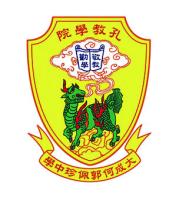| Language Policy |
1. In S.1 to S.3, the school adopts different mediums of instruction to cater for students’ abilities. In order to increase students’ exposure to the English language and ensure a smooth transition to the senior forms’ curricula, in some classes, Integrated Science (Physics, Chemistry and Biology in F.3) and Geography are taught in English while modules of Mathematics and Information and Communication Technology are incorporated with extended English learning activities. In other classes, students’ first language is the major medium of instruction, while modules of Mathematics, Integrated Science, Physics, Chemistry, Biology, and Geography are incorporated with extended English learning activities. (For more details, please refer to Subjects to be Offered in the 2023/2024 and 2024/2025 School Years.)<br>2. Some of the English lessons of S.1 to S.6 are conducted in small groups to facilitate teacher-student interaction and increase learning efficacy.<br>3. Both CMI and EMI groups are offered in most elective subjects in senior forms for students to select.<br>4. Bridging courses are provided for pre-S.1 students.<br> |
| Learning and Teaching Strategies |
The school adopts a diversified, student-oriented teaching mode, attaching much importance to interaction for learning and teaching. The school adopts a timetable of 30-minute periods to allow greater flexibility in the lesson time for various subjects. Also, one afternoon in every two cycles is spared for conducting various extra-curricular activities to enhance students' exposure to various learning experiences. |
| School-based curriculum |
1. Electives: 2X and 3X. Greater flexibility is allowed for students’ selection of electives, and students can have more than 50 combinations of subjects.<br> 2. Curriculum highlights: Various subjects make adjustments to their curriculum and teaching to cater for students' diversity in abilities. For example, under the fine-tuned medium of instruction arrangements, some of S.1 classes adopt the English medium of instruction while the rest have English medium extended learning activities. The school-based teaching materials involved are developed by teachers. English teaching elements are also appropriately incorporated into the various subjects of other levels. Life and Society is offered in the junior form curriculum which emphasizes students' personal growth elements and lets them understand China and the world and so forth. Besides, Chinese Classics is offered as a subject to teach Confucian philosophy and promote Chinese culture. |
| Approach to Catering for Learner Diversity |
Teachers develop class-based materials and adapt the curriculum through collaborative lesson planning and different assessment methods to accommodate the learning characteristics and abilities of pupils to enhance students’ learning effectiveness.<br>Diversified learning methods and in-class activities, such as group discussion, presentation, writing, painting, problem-solving tasks and audio materials etc. are adopted to suit our students’ learning needs.<br>The school implements a “One Sport One Art” programme where students are required to participate in one extra-curricular activity to develop their interest and potential in sports or arts and promote their aesthetic development as well as physical and psychological well-being. |
| Approach to Integrated Education |
The Students’ Support Committee comprises a Special Education Needs Coordinator (SEN Co.), six teachers teaching Chinese, English and Economics, social workers and an educational psychologist. In junior forms, there are English enhancement classes where small-class teaching is adopted to better cater for learner diversity. Meanwhile, the school hires external service providers to conduct Reading and Writing Groups, Integrated Education Mentor Training, language therapy, Board Game Groups, Adventure-based Training and counselling by clinical psychologists, in order to support students with different needs. In addition, seminars for parents are organized to help them understand students’ learning, behavioral, emotional and social characteristics. Life planning guidance is also a focus of the Students’ Support Committee. Students obtain information about studies and career through small-group counselling and visits to institutes and workplaces. An educational psychologist provides 20 days of on-sight service to support students, parents and teachers. |
| Education Support for Non-Chinese Speaking (NCS) Students |
|
| Home-School Co-operation |
The Parent-Teacher Association was established in 1992. It aims to enhance communication between parents and the school so as to enhance students' academic and moral development through the joint effort of the two parties. The Association sets up scholarship and funds for activities to support the school's educational development and improve students’ welfare. Besides, the Association organizes parent education activities, so that parents can share their ideas in mentoring their children. It also organizes parent-child activities for building a closer relationship between parents and their children, as well as to promote a sense of belonging towards the school among students and parents. |
| School Ethos |
The school attaches significant importance to students' good conduct and encourages students to develop themselves through different learning experiences. A non-academic performance scoring system has been established to reinforce and award students' good behaviour and service performance. A diversity of extra-curricular activities are held to encourage students to participate in social services. The Student Support Team provides various kinds of services for an integrated education and provide students in need with tailored support. Besides, we have the Ho Yiu-kwong Scholarship and Grant, the Parent-teacher Association Scholarship and the Chinese Classics Award, etc., to acknowledge and reward students for their good performance in various aspects. |
| School Development Plan |
School Development Plan 2021-2024<br>1. Cultivating positive values, attitudes and caring school culture.<br>2. Fostering curriculum development to improve learning effectiveness. |
| Teacher Professional Training and Development |
To conduct for teachers related seminars and workshops every year to support the school's overall development, to implement related training programmes in collaboration with various professional organizations; each teacher has to complete a certain number of hours of self-enhancement activities each year to better adapt to the progress of education reform. |
| Life-wide Learning |
There are almost forty extra-curricular activities, including service groups, interest groups, art groups and sport teams; various subjects also conduct local and overseas visits and other learning activities. |
